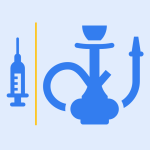Introduction:
Are you concerned about securing a life insurance policy due to health issues? While health is a common factor, it’s not the sole reason for the rejection of the application.
This article explores various factors that can lead to life insurance rejection and provides guidance on what to do if any of these factors apply to your situation.
Keep in mind that the list is not in a specific order, as each insurance company follows its own underwriting guidelines. Read on to gain insights that can streamline your life insurance application process.
Let’s explore common Life Insurance Rejection Reasons:
Here are the primary reasons for life insurance rejection. Keep in mind that this list is not exhaustive, and various life insurance companies may have distinct underwriting guidelines, leading to slight variations in their evaluation processes.
01. Health Challenges:

Several health conditions may lead to a rejection or higher premiums for life insurance applications. Listed below are some common health conditions that insurers often consider.
a) Cancer:
Despite the substantial improvements in cancer treatment witnessed in recent years, life insurance companies still perceive Cancer as a high-risk situation. The assessment of the life insurance application will heavily rely on multiple factors, such as the specific type of cancer, the extent to which it progressed, and the duration of the remission period.
Typically, life insurance companies are more likely to approve applications from individuals who had less severe forms of Cancer, for instance, Skin Cancer. However, more critical conditions, such as Breast Cancer, may undergo closer scrutiny during the assessment process.
b) HIV or AIDS:
Despite advancements in understanding HIV and AIDS, leading to significant improvements in life expectancy, life insurance companies continue to view HIV as a red flag, often resulting in outright denial of life insurance applications.
c) Elevated Cholesterol:
High Cholesterol levels can impact both your health and your eligibility for life insurance. Specifically, if you have elevated levels of LDL Cholesterol (commonly known as “BAD” Cholesterol) combined with low levels of HDL Cholesterol (referred to as “GOOD” Cholesterol), your risk for heart disease and stroke may increase.
Maintaining optimal Cholesterol levels is crucial for overall well-being. Collaborating with your healthcare provider allows you to create a comprehensive plan involving lifestyle adjustments, such as regular exercise, a balanced diet, and, if needed, medication.
It’s essential to note that each life insurance provider follows its unique underwriting guidelines. Some insurance companies may be more lenient when assessing applicants with Cholesterol concerns.
d) Heart Diseases:
Health conditions such as Heart Attack, Heart Failure, or Coronary Artery Disease can significantly affect the approval process for a life insurance application.
Understanding that each life insurance provider has its unique underwriting guidelines is crucial. These guidelines may vary in how they consider specific health conditions, including those related to the heart.
If you’re concerned about your eligibility due to such conditions, working closely with your healthcare provider to manage and improve your cardiovascular health can be beneficial.
Additionally, implementing lifestyle changes, such as regular exercise and a balanced diet, may positively impact your insurability by showcasing a commitment to maintaining a healthy lifestyle.
e) Elevated Glucose or Blood Sugar:
Elevated levels of glucose or blood sugar often signal the presence of diabetes, a condition that many life insurance companies may view unfavourably due to potential associated medical risks.
An intriguing aspect is that individuals may remain unaware of this condition until they undergo a medical examination for life insurance. Elevated glucose or blood sugar levels are typically present without noticeable symptoms, especially in the early stages.
Recognizing the significance of elevated glucose or blood sugar levels in the context of life insurance assessments is crucial.
f) Mental Health Disorders:
The presence of severe mental health disorders, such as Depression, Schizophrenia, Bipolar Disorder, PTSD, Anxiety Disorders, etc., can influence the approval process for life insurance. These conditions pose unique challenges and considerations for life insurance companies, impacting the overall assessment of the applicant’s eligibility.
Mental health is a complex aspect of underwriting, and insurers may scrutinize the specifics of each case. Conditions like Schizophrenia and Bipolar Disorder may lead to a more meticulous evaluation, taking into account factors such as the severity of symptoms, treatment plans, and overall stability.
However, insurance companies are more inclined to approve life insurance applications for individuals with minor mental health issues, such as Attention Deficit Hyperactivity Disorder (ADHD), Obsessive-Compulsive Disorder (OCD), Social Anxiety Disorder, and similar conditions.
Remember that the majority of mental health conditions are treatable. If you’re facing any mental health issues, seek professional help.
g) Obesity:
Struggling with weight can pose an obstacle to securing approval for life insurance. Insurance companies pay close attention to weight-related issues due to their potential to contribute to serious health complications, particularly those affecting the cardiovascular system.
Additionally, your weight, particularly the height-to-weight ratio, serves as a significant indicator of your overall health and fitness.
While being overweight or obese may not result in an immediate rejection of your insurance application, be prepared for the possibility of higher premiums. If weight concerns coexist with other health risks, the chances of facing a denial increase even further.
h) Kidney Disease:
Chronic kidney disease or other substantial renal issues can notably impact the approval process for life insurance. Insurers often scrutinize these conditions due to their potential to lead to complex health challenges and increased mortality risks, necessitating a more thorough assessment of the applicant’s eligibility.
It’s crucial to recognize that the severity and progression of renal issues play a key role in the underwriting process.
For instance, advanced stages of kidney disease may pose a higher risk, potentially affecting the terms of the insurance coverage or, in some cases, may lead to outright rejection of the application.
i) Respiratory Disorders:
Respiratory Disorders such as Chronic Obstructive Pulmonary Disease (COPD) or severe Asthma can influence the approval of the life insurance application. These respiratory conditions, known for their potential to cause chronic breathing difficulties, are closely examined by life insurance companies due to the associated health risks.
Chronic Obstructive Pulmonary Disease, characterized by progressive lung damage and severe Asthma, marked by persistent and potentially life-threatening respiratory symptoms, may raise concerns among insurers.
The severity of these conditions often determines the impact on insurance eligibility. In some cases, applicants may face rejection, while others may be subject to higher premium rates.
j) Autoimmune Diseases:
Autoimmune diseases, including conditions such as Lupus, Rheumatoid Arthritis, Multiple Sclerosis, etc, are frequently considered high-risk factors during the evaluation of life insurance applications.
These diseases entail the immune system mistakenly attacking the body’s own tissues, resulting in chronic health challenges that can significantly affect an individual’s quality of life.
Insurance providers carefully assess autoimmune diseases during underwriting due to their complex and unpredictable nature. The severity of symptoms, the potential for flare-ups, and the impact of ongoing treatments are key considerations in determining the associated risk.
Individuals dealing with Autoimmune diseases may find that life insurance companies view these conditions as posing an elevated risk, potentially leading to higher premium rates or, in some cases, an outright rejection of the application.
k) Elevated Liver Function:
Let’s explore the implications of Elevated Liver Function in the context of life insurance assessments. Certain markers become elevated when the liver cells undergo inflammation or damage, and specific chemicals are released into the bloodstream.
While this elevation is often mild and temporary, it can indicate underlying liver problems that raise concerns for life insurance companies.
A challenge for applicants is that they might only discover elevated liver function during the life insurance medical examination. In such cases, the lack of an opportunity for follow-up medical attention makes it difficult to determine whether the elevation is a temporary condition or indicative of a more serious issue.
Unfortunately, life insurance companies often adopt a cautious approach and may lean towards assuming the worst-case scenario, potentially resulting in the denial of the life insurance application.
Navigating Elevated Liver Function can be complex when seeking life insurance coverage. Applicants should take a proactive approach by understanding and addressing any underlying liver issues before undergoing the medical examination.
Seeking timely medical attention and taking the necessary steps to manage liver health can significantly enhance the chances of a successful life insurance application.
l) Hepatitis:
Let’s delve into the impact of Hepatitis on life insurance applications. In cases where Hepatitis B or C has been diagnosed, treated, and recovered completely, it typically doesn’t lead to application denial.
However, challenges may arise if the condition is recently discovered or revealed during the life insurance medical examination.
Initiating some form of treatment for Hepatitis is often a prerequisite for life insurance approval. Following a suitable treatment plan can improve your chances of securing life insurance coverage at a later date.
m) Hematuria or Proteinuria:
Now, let’s discuss the significance of Hematuria (Blood in the urine) or Proteinuria (Protein in the urine) in the context of life insurance assessments. From a life insurance perspective, the presence of these conditions may suggest an underlying kidney disease.
However, it’s crucial to recognize that vigorous physical exercise can also contribute to these findings. Identifying the precise underlying cause requires a subsequent medical examination.
Unfortunately, a challenge arises in a life insurance application when immediate follow-up medical attention is impractical.
Unless the insurance company is willing to await additional medical information to clarify the nature of the condition, the application process may be hindered. The life insurance company might hesitate to proceed without the necessary medical insights.
It’s important to note that the severity and management of these conditions play a significant role in the underwriting process. Some insurers may be more lenient or specialized in providing coverage for specific health conditions. Additionally, advancements in medical treatments and improved control of certain conditions may positively impact the approval process. If you have specific health concerns, consulting with an insurance advisor or broker can help you navigate the application process more effectively.
02. Adverse Family Health History:

In assessing life insurance applications, it’s not solely the applicant’s health that matters; the health of immediate family members also holds considerable weight.
This consideration stems from the understanding that if a family member, particularly the applicant’s mother or father, suffers from a hereditary disease, the likelihood of the applicant inheriting the same condition increases significantly.
03. Alcoholism:

Let’s address the sensitive topic of Alcoholism and its implications on life insurance applications. It’s important to note that we’re not referring to occasional or moderate drinking here. Instead, we focus on the presence of a positive alcohol marker indicating Elevated Liver Functions.
The combination of health damage caused by Alcoholism and the potential engagement in high-risk activities is sufficient for many life insurance companies to decline coverage.
If Alcoholism is currently a challenge you face, it is advisable to adopt a strategic approach when applying for life insurance. The best course of action would be to postpone your application until you have successfully ceased drinking.
Allowing ample time to pass, during which your claim of sobriety can be substantiated, will significantly improve your chances of obtaining coverage.
04. Smoking Addiction:

From a life insurance perspective, smoking is considered a high-risk behaviour. Numerous life insurance companies differentiate between two categories, each associated with distinct premium rates: ‘Smoker’ and ‘Non-Smoker.’
It is crucial to highlight that indulgence in excessive smoking, commonly referred to as chain-smoking, may lead to the outright rejection of the insurance application.
05. Substance Abuse:

When it comes to life insurance coverage, engaging in the confirmed use of potent drugs typically leads to an automatic decline during the application process. Just as with Alcoholism, breaking free from drug habits and establishing a consistent drug-free lifestyle is the most effective approach.
By taking proactive measures to address drug use and maintain a drug-free existence, you significantly enhance your chances of securing life insurance coverage in the future.
06. Hazardous Occupations:

Some professions inherently involve a higher level of risk than others, leading life insurance companies to potentially hesitate in approving policies for individuals employed in occupations deemed hazardous.
Occupations such as Construction, Mining, Military personnel, Police officers, Firefighters, Piloting, Commercial fishing, Logging, etc., are considered hazardous in India and may result in an increase in life insurance premiums.
If your profession falls within any of these occupations, it is essential to be aware that it may elevate the chances of potential denial of your life insurance application.
07. High-Risk Leisure Pursuits:

For some individuals, it is not their profession that raises concerns with life insurance companies but rather their pursuits outside of work.
Just as certain occupations carry varying degrees of risk, there are also extra-curricular activities that are deemed hazardous and entail a heightened risk of premature death. Engaging in any of these activities can present difficulties when seeking life insurance coverage.
The categorization of what constitutes hazardous extra-curricular activities can vary considerably across different life insurance companies.
However, some commonly observed examples include Skydiving, Scuba Diving, Recreational Flying, and Bungee Jumping. While you may find these activities exhilarating, life insurance companies may perceive them as unacceptably dangerous.
08. Financial Constraints:

In life insurance, understanding the role of financial prerequisites is paramount. It is essential to acknowledge that as per IRDAI guidelines, life insurance companies enforce a minimum income threshold, which serves as a determining factor for policy approval.
The likelihood of obtaining coverage may significantly diminish if one aspires to secure a substantial life insurance policy but possesses limited assets and a meagre annual income.
09. Previous Life Insurance Application Declines:

Disclosing instances where a prior life insurance application was declined or where you had to pay an additional premium due to certain health conditions can significantly impact the approval of your new life insurance application.
It’s crucial for informed buyers to proactively disclose any such incidents of previous application declines or additional premium payments. Even attempts to withhold this information can be futile, as life insurance companies have access to the Insurance Information Bureau of India (IIB).
Life insurance companies can utilize the IIB as a central repository of insurance data, including information on past applications, claims, and potential fraud. Accessible by all insurance companies in the country, the IIB serves as a comprehensive database that aids in evaluating the risk associated with insuring a particular applicant.
This database is a valuable tool for life insurance companies, aiding them in thoroughly evaluating applicants and mitigating the risk of fraud in the insurance sector.
10. Incomplete or Inaccurate Information:

Ensuring a smooth application process for life insurance involves the crucial step of providing accurate and complete information. Inaccuracies or omissions can result in misunderstandings between the policyholder and the insurer, potentially leaving the insurer unaware of associated risks.
To prevent complications and potential rejection, the applicant must furnish truthful and comprehensive information while filling out the application.
11. Travel History:

Insurers may be concerned when applicants have a history of travelling to high-risk or politically unstable regions. Some destinations carry elevated risks, including natural disasters, infectious diseases, war or warlike situations, terrorism, etc. Insurers assess an applicant’s travel history to gauge the level of risk exposure they might face.
If an individual has a track record of visiting regions with heightened risks, it can influence the approval of their life insurance application or result in higher premiums. These premiums aim to offset the perceived additional risk associated with the applicant’s travel history.
12. Criminal Record:

Insurers are concerned about the risks associated with life insurance applicants with criminal records. Certain criminal activities may indicate a higher likelihood of engaging in risky behaviours, which can increase the chances of the untimely death of the applicant.
As a result, individuals with a history of criminal activities may face rejection or higher premiums.
What are your options if your Life Insurance Application is Declined?
The purpose of this list is not to discourage you from obtaining life insurance coverage but rather to highlight the most common reasons for denials and, more importantly, to provide solutions to overcome them.
The initial step is to understand the specific reasons for the denial. Request written documentation outlining the reasons, as it can be detailed and may list multiple factors. This information is vital in determining your next course of action.
Applying to another life insurance company should not be your immediate response. It is crucial to know the denial reasons first, allowing you to address them and avoid repeated rejection.
Obtaining copies of your medical records is essential. Request all the medical records used by the life insurance company in the denial process. Thoroughly review these records to ensure that they don’t contain any false or questionable information.
If you discover any inaccuracies, it is crucial to have them corrected since other life insurance companies may access them through shared databases.
Collaborating with an independent insurance broker should be a key strategy. It saves you both time and money. Their services come at no additional cost compared to applying directly to a life insurance company. By leveraging their knowledge and connections, they can match your application with the most suitable insurer, increasing your chances of approval.
Frequently Asked Questions:
What is the typical timeframe for determining the acceptance or rejection of a life insurance application?
There is no fixed timeframe, but generally, it takes a week or two. The timeframe is contingent upon the specific underwriting process of the insurance company.
Can the rejection of a life insurance application affect future applications?
Yes, a rejected application may impact future applications. Understanding the reasons for rejection and addressing any issues before applying again is essential.
Are there alternatives for individuals with a high-risk profile?
High-risk individuals may explore options like guaranteed issuance life insurance policies, although these often come with certain limitations and higher premiums.
Can a low credit score affect life insurance approval?
While life insurance companies typically don’t consider credit scores, a poor financial history might influence the issuance of certain life insurance policies.
How is the application review process different for various types of life insurance?
The standards for assessing life insurance applications can change depending on the type of plan. Generally, getting approval for high-risk life insurance plans involves a more stringent process compared to low-risk plans.
What are the possible outcomes of the life insurance application besides Acceptance and Rejection?
A life insurance application can have four outcomes: i) Acceptance, ii)Rejection, iii)Postponement (Specific waiting period is applied, iv) Loading (extra premium is payable for approval)
How does the waiting period work for certain health conditions?
Some policies have waiting periods for specific health conditions. It implies that one can reapply after the waiting period specified by the insurance company.
Can I reapply for life insurance after a rejection?
Yes, you can reapply. However, it’s crucial to address the reasons for the previous rejection and demonstrate improvements in those areas.
How can I dispute a rejection decision?
If you believe the rejection is unjust, you can inquire about the appeals process with the insurance company. Providing additional documentation or explanations may be necessary.
Conclusion:
In conclusion, if your life insurance application is denied, it’s crucial to recognize that there are options available. Understand the reasons behind the denial, rectify any inaccuracies in your medical records, and consider seeking assistance from an independent insurance broker. An experienced broker can navigate the complexities of the insurance landscape and connect you with companies more inclined to approve your application.
By taking these proactive steps, you can overcome denial and secure the life insurance coverage necessary to protect yourself and your loved ones.
Remember, your financial well-being is paramount, and with proper guidance, you can discover insurance solutions that align with your specific needs. If you have any questions, please feel free to Contact Us.
Disclaimer:
This article provides general information only and does not constitute financial advice. Financial regulations, product terms, and industry guidelines are revised from time to time. While we have made efforts to ensure the accuracy of the information presented, we do not guarantee its completeness or accuracy. We disclaim any liability for loss or damage arising from actions taken based on the information provided in this article. To make informed financial decisions, please do your own research and consult with a qualified financial professional.
SPREAD THE WORD WITH YOUR NETWORK

